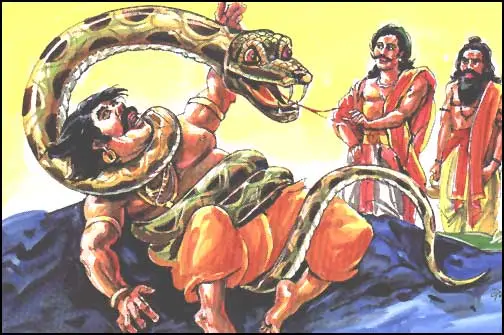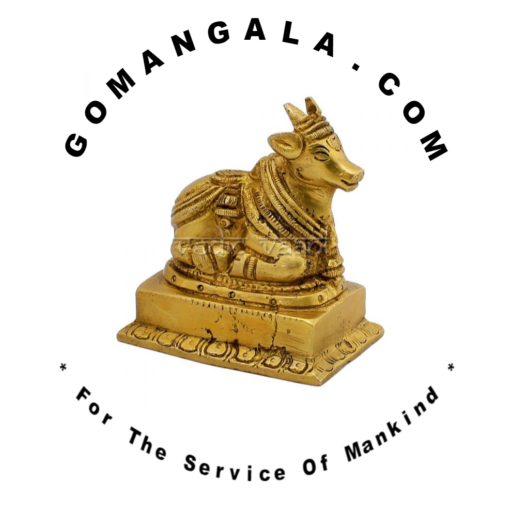Ajagara Parva is the thirty sixth upa parva included in the third maha parva, named as Vana parva or Aranyaka parva in the epic Mahabharata. The original epic was composed by Vyasa in Sanskrit. Vyshampayana had narrated to Janamejaya the historical events, happened during the exile of Pandavas on his queries.
Who had permitted Arjuna to live on top of the Gandhamadana Mountain?
The Angel God of wealth and treasures, Kubera, or Vaishravana had permitted to live Arjuna on the top of Gandhamadana Mountain.

How did Yudhishtira spend four years on top of the Gandhamadana Mountain and what was Arjuna doing then?
Yudhishtira had joined Arjuna and spent four years on the top of Gandhamadana Mountain during their exile. Thus they had completed ten years of forest life.
On the top of that mountain, the rivers were flowing from the natural tanks, trees and flowers were memorable but Arjuna was eager to go to some distant place where Duryodhana could not assess about their stock of weapons. Hence with the help of Ghatotkacha, the Pandava brothers had descended to the lower land. They received the blessings of Lomasha Maharshi and then Arjuna told to Yudhishtira he was ready to wage war against Duryodhana at any time but they had to live one year without the knowledge of anybody called as Ajnathavasa.
What was the route traced by the Pandava brothers in the twelfth year of exile?
When the Pandava brothers completed their eleventh year, they started to trace their return path, looked back and found the Kailasa Mountain at a distance. They thanked Kubera for providing a pleasant stay for one year there and later they started towards the palace of Vrishaparvana. It was similar to an Ashram. The King Vrishaparvana had treated Yudhishtira with great reverence and then they started towards the Badari Narayan abode. They enjoyed the beauty of the water tank at Badari and offered daily routine prayers to Narayana, for a period of one month continuously.
Then, crossing the Himalayan valleys, they had reached the palace of Subahu. King Subahu and Ghatotkacha had arranged their journey towards Yamunadri Mountain. The forest was comfortable and Ghatotkacha used to hunt there. During the winter, the Mountain was covered with white snow and looked like a white cloth cover. The Pandava brothers had spent one year over the Yamunadri Mountain. There after, they had entered the Saraswathi River bank and spent the balance time till the twelfth year, enjoying the good and healthy natural surroundings.
What happened when Bhima went on hunting near Vrishaparvana Ashram?
Ghatotkacha was the son of Bhima and he was a demon by nature. As usual to demons, he ate forest animals and had a gigantic physical body. In order to satisfy Ghatotkacha, one day, Bhima had started hunting on the forest route near the Vrishaparvana Ashram.
After moving in the dense forest, he had seen very beautiful trees, swans, animals and small water streams flowing with pure water. In the thick forest, there was a very big boa and when Bhima had touched the tail of the boa, the entire body of Bhima shivered and lost his strength automatically. His mind was working and he could speak. He asked about the boa after telling own identity as Bhima in brief and grief about Pandavas. Then the boa had fully surrounded the body of Bhima and his hands were free but legs were tied up and he fell to the ground helplessly. The big boa could speak. It had told to Bhima about its name as a cursed old king Nahusha and if he could answer its questions properly, he would be let free but in case he fails, the boa would eat him and finish the story of Bhima.
What Yudhishtira had done when Bhima was absent?
When Bhima was absent in the camp, Yudhishtira had enquired the whereabouts of Bhima with Draupadi. Yudhishtira called him loudly and confirmed his absence. He told Arjuna to remain with Draupadi in the tent and walked with Dhaumya Rishi in search of Bhima. They could trace the cleared path of bushes and got the route where Bhima had moved. Finally, they saw Bhima under the capture of the big boa laid down in the forest. Yudhishtira had collected the information about the terms and conditions of the boa from Bhima. He decided to liberate Bhima from the hold of the boa. He had also spoken to the boa and tried to answer its questions.
The boa had asked Yudhishtira as what are the features of a genuine Brahmin.
Yudhishtira had answered to the boa as, any humble person who practices non-violence full time, is always truthful and possesses good knowledge was the Brahmin.
What conclusion had been declared by the boa or Ajagara?
The boa had asked many supporting questions with Yudhishtira. But Yudhishtira had answered all of his questions satisfactorily. By the standard of questions, Yudhishtira had judged that the cursed old king Nahusha would be a great scholar. Hence he asked him to clarify about the status of rebirth after death. The boa had clarified his doubts, as according to the actions of the persons, the rebirth would be mainly categorized into three.
- One may get into heaven if one had done works of virtues.
- If any sinful actions were done, then he or she would be born as an animal, bird or any creature deserved according to the quantum of sins accumulated to their portion of the soul’s account.
- He would be getting a birth as a human being if the virtues were worthy for the same.
Why the old king Nahusha had become a boa in his rebirth then?
King Nahusha had become a boa by the curse of Agastya Maharshi. He was very proud of his wealth or worldly assets and donated as much as food and gold required for Brahmins. With pride, he ordered old Brahmins to carry him over palanquins in the royal road exhibitions. Due to liabilities, the learned scholars even though very old, had withstood his weight over palanquins and walked with difficulties.
In order to test the knowledge of King Nahusha, Agastya Rishi when he was carrying him over the palanquin asked him one question regarding a Vedic verse as a proof of the holiness of cows. Nahusha told proudly no proof was available in Vedas about the holiness of cows. But while speaking, the left leg of the king Nahusha had touched the head of Agastya Rishi. The displeased Agastya Rishi had cursed him to be a boa and live as a snake for two thousand and five hundred years, and retreated saying proof was available in the Vedas as cows were holy.
गावो मे मातरः सन्तु पितरः सन्तु गोवृषः । ग्रासमुष्ठिं मया दत्तम् गृहाण परमेश्वर ॥
Meaning: Let the cow be considered as my mother, let the calf be considered as my father, O God Parameshwara, kindly accept the grass I offered.
Then Nahusha begged his pardon. Agastya consoled him with an assurance; as an end to the curse, he would be a normal king again when he would treat the wife of Indra, Shachi as his mother and when a man without ego called Yudhishtira clarified about the perfections of a Brahmin during his forest life.
After quizzing mutually about the important philosophical items, both of them had been satisfied. Then Yudhishtira had guessed about Nahusha as a great old king with good virtues and desired his advices for future victories. He advised Yudhishthira to avoid ego by Bhima, told more about the consequences of sins and curses would be narrated by king Shalya in a later period to him. The king Nahusha thought mentally Indra as a Brahmin, his wife, Shachi as equivalent to mother, and then redeemed of his curse, abandoned his snake form as boa and he made the body of Bhima free.
What was the mistake committed by Bhima and how was it rectified?
Bhima had started hunting animals by ignorance with ego but later realised that life was precious to all living creatures; when he was caught by the boa. Gatotkacha would eat forest animals but it was the mistake of Bhima to support his hunting habits in the Himalayan valleys. After the proper answers of Yudhishtira, the boa had advised Bhima as in the following verse and left the world to enter the heaven as king Nahusha obediently towards Indra and Shachi.
सत्यं दमस्तपो योगमहिंसा दाननित्यता । साधकानि सदा पुंसाँ न जातिर्नकुलं नृप ॥
Meaning: O King, Truthfulness, penance, nonviolence, donation offering daily to the deserving is the practice to be achieved by the persons but not by the varnas.
Dhaumya Rishi and other Brahmins also advised Bhima to be humble. Then he decided to teach the importance of non-violence to his son Ghatotkacha.
The initial part of the story of Nahusha would be narrated by king Shalya to Yudhishthira, later when they meet in Upaplava under Senodyoga Parva.
On reading this story, children would gain more memory power.
Next post, Mahabharata: Markandeya parva would be more interesting.
Mahabharat: Draupadi Sathyabhama would be presented separately in another article.
It is humbly prayed for the blessings of God Krishna upon us.
Readers may share this story with children, friends and family.

0 Comments
1 Pingback